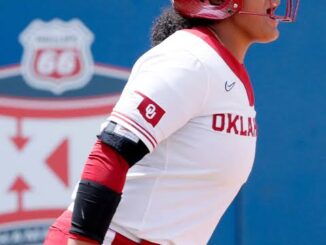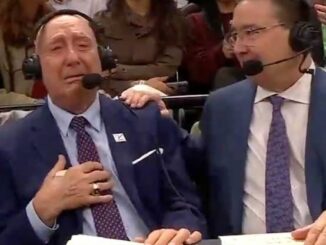
RESIGNATION: Raegan Beers Makes Controversial Speech on Oklahoma Sooners, Cites Lack of Support for Family Issues.
In an unexpected turn of events, Raegan Beers, a prominent member of the Oklahoma Sooners, announced her resignation from the team following a controversial speech in which she claimed the organization had failed to provide support for her family’s personal struggles. The announcement sent shockwaves through the athletic community and left fans and colleagues alike questioning the future of the rising star.
Beers, who had been a standout player for the Sooners, delivered a passionate speech at a press conference earlier this week, where she expressed her frustrations over what she perceived as a lack of empathy and assistance from her teammates, coaching staff, and the university. The 20-year-old athlete described her recent personal challenges, which involved her family, and revealed that she felt isolated and unsupported during what she considered a difficult period in her life.
“I’ve given everything to this team, but when I needed support the most, I found myself alone,” Beers began in her statement. “My family has been going through some tough times, and instead of getting the support I hoped for, I was met with silence and indifference from those who should have had my back. It’s not just about the game—it’s about being part of a family, and right now, I don’t feel that connection.”
The Oklahoma Sooners community, known for their camaraderie and team spirit, was left reeling after Beers’ comments. The 20-year-old athlete’s resignation came after weeks of what appeared to be growing tension within the team, as Beers had previously hinted at personal struggles but had not directly addressed them in public.
Her speech painted a picture of disappointment and disenchantment with the organization that had given her an opportunity to shine on the national stage. She went on to describe specific instances where she felt the team’s leadership could have done more to support her. “When my family was struggling, I didn’t just need a teammate, I needed a support system,” she said. “I was hoping for a level of understanding that was never offered. I was forced to carry on as if everything was fine when in reality, it was anything but.”
The resignation has sparked an outpouring of reactions from fans, colleagues, and former players. Many expressed shock and sympathy for Beers, while others questioned the timing and nature of her departure. Some speculated that Beers’ frustrations had been building for months, as her performance on the field had seen noticeable changes in recent weeks, which some attributed to personal stress.
In response to Beers’ resignation, the Oklahoma Sooners athletic department issued a statement expressing regret at her decision to leave the team. “We are saddened by Raegan’s decision to resign and fully respect her choice. The well-being of our athletes is always a priority, and we are committed to providing the necessary support to all of our players. We hope that Raegan finds the peace and support she deserves as she navigates through these challenging personal matters.”
Despite the public support from the university, many are questioning whether enough is being done within collegiate sports to address mental health and emotional well-being. Beers’ departure has underscored a growing concern among athletes about the pressures they face and the lack of resources available to support them when personal crises arise.
Raegan Beers’ resignation marks a pivotal moment in collegiate athletics, highlighting the need for greater attention to the emotional and mental health of athletes, especially when dealing with family or personal struggles. As her departure reverberates throughout the world of sports, it raises important questions about the balance between performance and personal well-being, and how organizations can do more to ensure that their athletes are supported not only as players but as individuals.



Be the first to comment